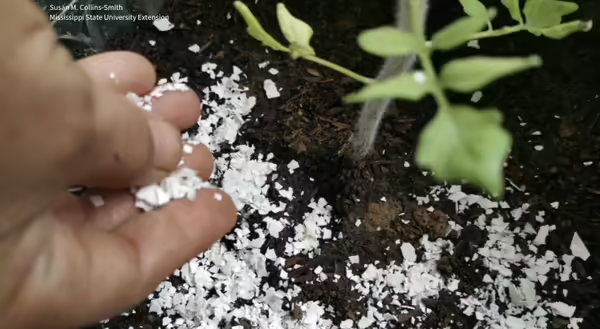
From homemade pesticide applications to adding eggshells to the soil, gardeners are always looking for natural alternatives to current gardening practices. Over the past few years, there has been an influx of gardeners adding eggshells, coffee grounds, and dish soap to their gardens to improve soil health, decrease insect pests, and decrease chances of blossom end rot. While there is some research to back up these claims, understanding the impacts of these applications to soil health and pest communities remains unknown.
Myth #1: Eggshells are a sufficient source of calcium to prevent blossom end rot
Blossom end rot occurs because the soil does not have calcium readily available for plants to use. Eggshells are commonly incorporated in gardens due to their presence of calcium, which tomatoes and peppers require to set mature, ripe fruit (Sawyer 2024). Eggshells can take anywhere from one to five years to break down and may not be readily available to plants and soil, including crushed eggshells (Enroth 2018). Illinois soils already contain an adequate amount of calcium for garden plants, oftentimes, blossom end rot (BER) can occur due to water transport issues that prevent the flow of calcium throughout the plant.
Some ways you can prevent BER in the garden and use eggshells are listed below:
Even watering can help maintain soil moisture and encourage transpiration of water and calcium.
Perform a soil test and apply fertilizer according to the results and recommendations that are on the results and fertilizer label.
Add crushed eggshells to your compost. Crushed eggshells will still take a few years to break down but is an alternative to the landfill.
Myth #2: Household vinegar can treat and kill weeds effectively
Gardeners are often looking for alternatives to hand weeding and roundup applications, which makes vinegar a hot alternative due to the presence of acid that makes it favorable compared to glyphosate. Vinegar can treat and kill weeds, but it must be herbicidal vinegar or acetic acid, not household vinegar (Fiola and Gill 2024). Herbicidal vinegar is stronger than household vinegar with a concentration between 10-20%, which is higher than household vinegar at 5%. Typically, acetic acid can treat and kill broadleaf weeds but may cause injury and necrosis in grass weeds (Fiola and Gill 2024). If acetic acid is applied, a surfactant will be required to encourage thorough mixing.
Note: Although acetic acid can be effective, vinegar with concentrations greater than 11% can cause severe eye injury and burn the skin if applied unsafely. Please follow the label, make sure all chemicals are registered by the state, the chemicals are safe for use, and protective equipment is worn.
Myth #3: Used coffee grounds can lower soil pH and increase acidity
Used coffee grounds are added to homeowner’s gardens and compost to lower pH and improve soil health and quality, yet there is very little research to back up these claims (Enroth 2018 and Sawyer 2024). Coffee grounds contain carbon, nitrogen and other micronutrients that feed soil organisms and their communities. Soil organisms break down these nutrients and make them available for plants to use. Adding too thick of a coffee ground layer can decrease water infiltration and cause a water-repellant layer to form. When in doubt, used coffee grounds are great in a compost pile and guaranteed the worms will love it.
Note: If you are interested in lowering the pH in your garden, elemental sulfur will be a safe and affordable option compared to coffee grounds. Iron and aluminum sulfate may be used but are more expensive than elemental sulfur.
Overall, household products should be applied cautiously when used in the garden as they may not provide as many benefits as assumed for soil health and pest interactions. Adding eggshells and used coffee grounds to compost may be a better alternative than adding it to the garden, as compost relies on waste materials and nutrients (Sawyer 2024). Have you tried any of these methods in your garden? Reach out to your local Extension office with any questions or concerns about safe gardening practices and what household products may be safe.
Caution: Mention of chemical use or use of a pesticide label is for educational purposes only. Always read and follow the label and safety instructions; the label is the law.
For more information, check out the University of Illinois Extension’s Local Food and Small Farms YouTube Channel for growing tips and other horticultural advice.
About the author: Alexis R. Barnes is the University of Illinois Extension Local Food Systems Small Farms Educator serving DuPage, Kane and Kendall Counties. Barnes’s areas of expertise include specialty crop production, USDA Certified Organic and cover crop integration.
Photo Courtesy: Susan M. Collins-Smith at Mississippi State University Extension spreading crushed eggshells around the stem of a tomato plant.
References:
Enroth, C. 2018. Good Growing: How to Use Eggshells in the Garden and Compost. https://extension.illinois.edu/blogs/good-growing/2018-03-28-using-eggshells-garden-and-compost [Accessed 28 March 2025].
Sawyer, A. 2024. Yard and Garden: Coffee Grounds, Eggshells and Epsom Salts in the Home Garden. https://extension.umn.edu/manage-soil-nutrients/coffee-grounds-eggshells-epsom-salts [Accessed 28 March 2025].
Smith-Fiola, D. and Gill, S. 2024. Vinegar: An Alternative to Glyphosate? https://extension.umd.edu/resource/vinegar-alternative-glyphosate [Accessed 28 March 2025].